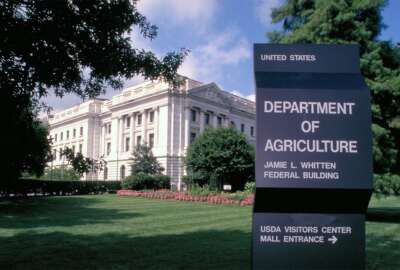
For USDA employees, unknowns of reopening phase three pose unnecessary risk
As the Agriculture Department approaches phase three of its reopening plan, Food and Nutrition Service employees are concerned there are simply too many unknown...
This story was updated on Monday, July 6 at 11:45 a.m. to reflect additional statements from the Agriculture Department.
As federal agencies press ahead with their reopening plans this month, some Agriculture Department employees are grappling with the unfamiliar prospect of reentering a nearly full office during a pandemic.
USDA, which entered “phase one” of its reopening plan back on June 1, has been at the forefront of reopening in the national capital region. Just 400 USDA employees were part of the initial reopening, with 700 employees back at their offices during the department’s phase two reopening on June 22.
USDA emails and reopening plans from leadership initially indicated that Monday, July 6 was the earliest possible day most employees would return to their offices in the national capital region under phase three, the last stage of the department’s reopening plan.
“USDA has not announced its phase 3 reopening date for the national capitol region, we await more information from state and local governments on their phase 3 of reopening to inform our decisions,” a department spokesman said in an email to Federal News Network. “USDA will continue to provide all employees seven days notice before coming back into the office.”
But phase three, which, like many agencies, is the stage where USDA anticipates having the vast majority of its workforce back in the office, poses too many unknowns and plenty of anxieties for some employees at the Food and Nutrition Service.
“What’s the rush?” said Daniel Cline, executive vice president of the National Treasury Employees Union chapter representing 400 employees at the national Food and Nutrition Service office in Alexandria, Virginia.
“We have been successfully advancing all of the agency’s mission work, while taking on all sorts of new mission work that has been tasked to us by Congress as part of the Covid-19 response,” he said. “We’ve been taking all that work on in stride while continuing our normal agency operations, and we’ve been doing this all from home. What this crisis has shown is just how efficiently our agency can operate from a telework-heavy posture.”
Employees there have been teleworking for nearly four months, where they’ve spent most of their time on Zoom calls and email. Cline said FNS employees have been overseeing and administering pandemic-related changes to their nutrition programs, though the national office has no direct, customer-facing role.
Many of the concerns of some Food and Nutrition Service employees aren’t necessarily unique to USDA. Employees at the Environmental Protection Agency told reporters Thursday they too are concerned about taking public transportation, sitting in close proximity to their coworkers and receiving accommodations they say they need to continue teleworking with children at home.
A Federal News Network survey found the vast majority of teleworkers had some level of discomfort with their return to the office.
Still, USDA’s phase three reopening plan has posed anxiety and uncertainty for FNS employees. According to USDA reopening plans, employees with caregiving responsibilities during phase three should talk to their supervisor about extending telework or flexible work schedules.
FNS employees who are high risk for coronavirus should also talk to their supervisors about their options. Reasonable accommodations for employees in those situations aren’t applicable, according to a June 26 document on FNS reopening.
“To date, USDA has allowed supervisors flexibility for all types of caregiving,” a department spokesman said. “USDA continues to monitor state and local school decisions to determine next steps when it comes to care giving flexibilities.”
There will be no changes to the USDA telework policy, according to the FNS document. USDA was one of the first major agencies to cut back on telework to one day a week, per a policy change back in 2018. Since then, the Education Department and Social Security Administration have made similar reductions.
For FNS employees with children or high-risk dependents and family members at home, the agency’s plans give them little assurance and certainty that their supervisors will accommodate their requests for additional flexibilities.
“Their attitude is we’re moving full steam ahead. Your supervisor will let you know seven days out when you’re expected to report in, and you can figure out your personal situation with your supervisor at that time,” Cline said. “From the union’s perspective this is passing the buck on one of the biggest crises that has faced this nation in a century. It’s not leadership, and it’s not sufficient for the lives of the employees of USDA FNS.”
In a video message to the USDA workforce last month, Secretary Sonny Perdue acknowledged employees may feel anxious about returning to the office.
“We want all of you to feel comfortable there because we are a great team, and we are a great team together when we’re here,” he said.
The department is providing masks to employees who don’t have one, and they’ll be required while inside USDA facilities.
Reopening plans detail what spaces will be cleaned and when, and employees are expected to bring in supplies from home to clean their own desks and office spaces.
“One extra wipe down of a coffee machine is not going to give our members any confidence in the safety of returning to this office,” said Cline, who noted that agency leaderships have not sat down with the union to discuss their concerns.
The sheer logistics of following proper social distancing protocols with several hundred employees back in the building also seem daunting.
Cline said the FNS building in Alexandria has four elevators, and under USDA policy, two employees are allowed to take the elevator at one time.
“How does that math work out? I imagine you’re going to have a lot of people who are then stuck waiting in the lobby,” he said. “God forbid anyone wants to go down for lunch or the whole day would be wasted waiting for the elevator. I think these are the types of issues that the agency hasn’t fully thought through.”
Wait times for the elevators will vary, FNS said in its reopening documents, especially at the beginning and end of each day.
“Employees should discuss changes to their schedule with their supervisor if they have concerns about wait times on elevators,” FNS said in its reopening document.
Employees are also concerned with USDA’s approach to contact tracing, Cline said. According to USDA reopening plans, the department will interview employees who test positive to identify their contacts in the building for the last three days.
USDA will not announce each positive case to the workforce; employees have to check a Sharepoint site to see when and where cases have occurred.
“USDA recognizes that as employees come back to the office, they will want to be apprised of test positives in the building in which they are located and what the process will look like,” the reopening document said. “The department is working on what that policy will look like and will update guidance as its available accordingly. At this time, the department is not providing free COVID-19 tests for employees.”
For Cline, it’s unclear how much time will pass between a positive coronavirus test and when the Sharepoint site would be updated.
“What can employees do after there’s a positive case? If there’s a positive case in my building where I work every day, am I expected to merely stay at work for the rest of my shift and report in the morning, not knowing where that case is?” he said. “It seems like we need a more complete approach, a holistic approach, to how positive cases will be treated.”
The USDA spokesman said the department will update the coronavirus tracker daily, and the tracker will indicate a positive test by close of business on the day the case is reported.
“[For] days in which there is no test positive reported, no new information will be posted to the Sharepoint site,” the spokesman said.
But beyond the concerns over special accommodations, social distancing and contact tracing at USDA, Cline said his members worry the anxiety and inconveniences that will inevitably come with their return to the office aren’t worth the benefits of returning to a “new normal” during the pandemic.
“It’s inexplicable why we would be asked to return at a risk when we’ve been so successful working from home,” he said.
Copyright © 2024 Federal News Network. All rights reserved. This website is not intended for users located within the European Economic Area.
Nicole Ogrysko is a reporter for Federal News Network focusing on the federal workforce and federal pay and benefits.
Follow @nogryskoWFED




